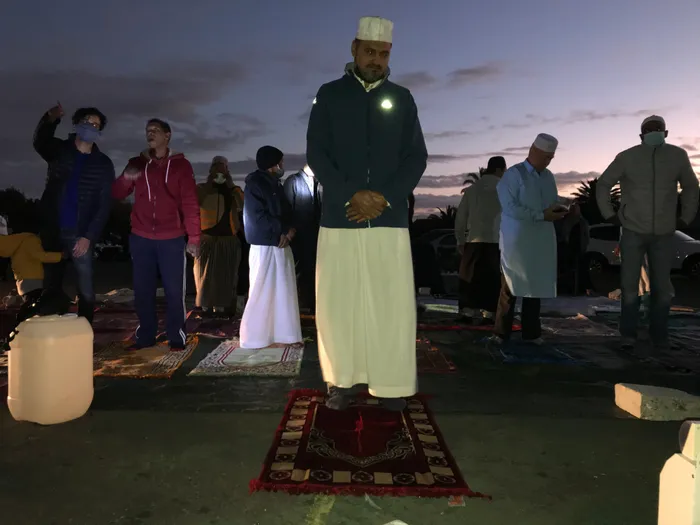Muslims observe Ramadaan halfway mark

Maulana Aadam Ebrahim Adams getting ready to lead prayers on an open field in Parow.
Ramadaan, the holy month of Islam, has reached the halfway mark and Muslim residents of Parow came together on Wednesday night to host a mass breaking of their fast, or iftar, at an abandoned sports court between Oldham and Bedford streets.
The iftar is typically done at one’s home with family, but the organisers of the mass iftar saw the 15th night of Ramadaan as a chance to not only feed the needy but to educate non-Muslim friends about their faith.
The organisers meet every weekend during Ramadaan to make a pot of food for the poor.
“We started this project during lockdown last year, and we just continued, so it’s just over a year that we are doing this, making food and distributing it to those in need,” said Shihaam Arend, one of the volunteers.
Last year, because of the lockdown, Muslims all around the world could not attend the evening prayers (known as taraweeh salaah) at mosque, which are customary during Ramadaan. This year is different due to more relaxed lockdown restrictions.
Maulana Aadam Ebrahim Adams says last year was gloomy as traditions were not allowed, but there were positives within the 2020 Ramadan.
“It was a very tough year for us,” said Maulana Aadam Ebrahim Adams, who led prayers at the iftar. “No taraweeh salaah, the masjids were closed and the spirit of unity was not the same. But, on the other side, families had to read the Qur’an at home and make salaah at home, so that was the positive that families united at home and built their bonds.
“It was a sad time last year but look at this change now. We are coming together and bringing people from all walks of life together. Ramadaan is to share; it’s about caring not only for your Muslim brother and sisters; it’s about sharing and caring with everyone. We can show our neighbours and friends this manner of sharing, about feeding the needy, the poor. It’s about learning what Islam is and practising gratitude.”

Abraar Johnson, a 14–year old pupil at an Islamic high school in Athlone, said the lockdown had been particularly difficult as he had been unable to go to mosque.
“I missed going to mosque, but, at the same time, it was easy to make salaah at home, to read the Qur’an at home with my family. This year, we have gone to mosque, but we are at home most times. It’s been a good Ramadaan.”

Taybah Mammath, 18, said she had missed not having had her extended family around for iftar last year and was more appreciative of coming together with them this time around.
“Last year was sad, as we could not see family that we would normally go to during Ramadaan, so I really missed that. This year it’s almost back to normal. We could break the fast with other relatives, so I enjoyed being with them, sharing the experience of fasting and just being in the company of those you love and respect.
Waleed Arend, a 47-year old owner of a mechanical workshop, said: “It was hard not being able to see the family and friends during a time when we usually see them. However, that is when we got together with other like-minded people and made a plan to feed the needy, so that was the positive of last year’s lockdown, coming together under difficult circumstances to do good.”

The volunteers served koeksisters, boeber (a traditional sweet milk drink), samoosas, vegetable soup and chicken akni among other tasty treats at this gathering.
Mr Adams, who is also a member of the Muslim Judicial Council, reminded those in attendance that charity, or sadaqa, in Islam should not only be performed during Ramadaan but all year round
“This act of giving brings communities together,” he said.
